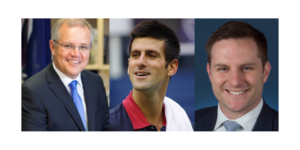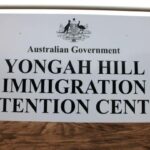The Djokovic Saga: A Convenient Distraction for the Government

Immigration Minister Alex Hawke has exercised his ministerial powers to revoke Novak Djokovic’s visa, meaning the world’s best tennis player could be deported and miss the Australian Open if his latest legal challenged, scheduled for hearing in the Federal Court at 10.15am tomorrow, is unsuccessful.
The story so far
It’s a story that’s dominated headlines since Border Force cancelled Mr Djokovic’s visa upon his arrival in Australia on 5 January 2021, only for it to be reinstated by way of consent orders in the Federal Circuit Court last Monday.
Then, on Friday evening, after facing a great deal of criticism for taking so long to hand down his decision, the Immigration Minister made the decision to revoke the tennis player’s visa under under section 133C(3) of the Migration Act “on health and good order grounds, and on the basis it was in the public interest to do so”.
The decision also means Mr Djokovic could be prohibited from re-entering Australia for at least three years.
‘Protecting the borders’
Mr Hawke said he had “carefully considered information provided” by Djokovic, his own department, and the Australian Border Force.
“The Morrison government is firmly committed to protecting Australia’s borders, particularly in relation to the Covid-19 pandemic,” Mr Hawke said in a statement.
But Australia is already currently in the middle of a pandemic, case numbers are soaring daily, and it is difficult to see how a single tennis player could be a serious threat to public health at this time.
In the meantime, it has been reported that two other tennis players who had medical exemptions have since departed Australia too, only adding to the controversy and confusion.
Aren’t we supposed to be getting ready to ‘open up’ the country?
While Mr Djokovic confirmed he was unvaccinated and sought a medical exemption based on having recently had Covid, it’s not clear how the other players and officials were allowed through immigration, nor does it provide any clarity around the processing of tennis players or how this procedure could have been bungled so badly, while the world was watching on.
The Australian Open is held annually and officials across all jurisdictions have had ample time to plan and prepare.
Many have viewed these events as a political stunt by the Morrison Government to flex its muscle on a global stage, to showcase Australia’s ‘tough border policies’ (for which it has been condemned by organisations such as the United Nations).
The treatment of Mr Djokovic has been appalling, especially given that it’s been reported that the other players who have since left the country were let in and able to roam freely around Melbourne. By contrast, Mr Djokovic was locked up in Melbourne’s Park Hotel, until he was freed by the Federal Circuit Court decision where 32 Medevac refugees have been detained since their removal from offshore detention in December 2019.
In the middle of the week the Prime Minister of Serbia spoke to Scott Morrison simply asking that Mr Djokovic be treated ‘with dignity’.
A convenient distraction
The saga might not yet be over, as his lawyer’s applied for an injunction for their client to remain in Australia pending a further Federal Court hearing, which is scheduled for tomorrow morning.
It has also been reported that Mr Djokovic holds a Diplomatic passport, although it is unclear whether or not this will make any difference.
Losing the world’s number one will definitely be a blow to the Australian Open, which is due to start next week.
But in any event, the saga has provided the Morrison Government with very a convenient distraction, taking the focus away from the real problems it should be solving, such as severe gaps in grocery supplies, a health system under strain, and a critical shortage of Rapid-Antigen Tests – all of which have a much more immediate impact on the lives of Australians right now.







